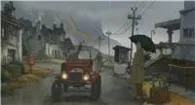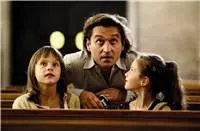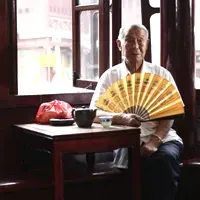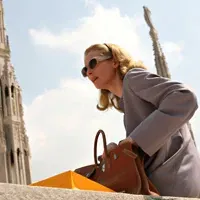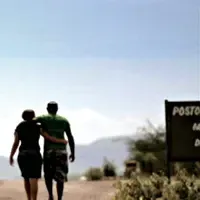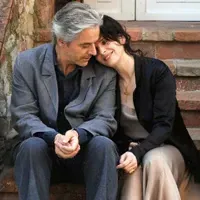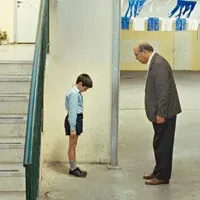NZIFF: Daily Reel
Written by
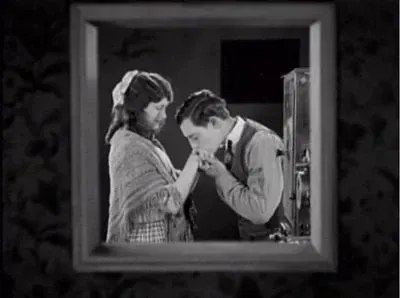
Like a swooning teenager in his first slow dance, Simon Zhou attended the 2010 New Zealand International Film Festival in Auckland with clammy-palmed criticism and reviews that shared his love for the movies.
Read his Daily Reel archive here.
* * *
July 28: First Kiss, On A Banana Plantation
I do not remember any facts from the first time I went to the movies. I do not remember the title of the film, or what the story was, or what actors were in it. But I remember feelings and disparate thoughts. I remember that it was with my parents, and that we were running late because we’d gone to the flea market earlier, and that I had confused it for a banana plantation, because underneath one of the shoddy iron roofs were so many cardboard boxes full of bananas, that it seemed to me that cardboard boxes must have been their natural habitation. I remember picking at the stuffing in the backseat of our old, Plymouth blue Toyota Corona, and my father singing a Cantonese pop song along with a cassette tape, and my mother telling him not to drive so fast, even though we were running late.
I remember holding my mother’s hand as we walked into the darkened movie theatre, and my father whispering throughout the movie to my mother to translate the dialogue into Cantonese for her. As for the movie itself, I remember only that it made me happy, and then scared, and then happy, and then sad, and then happy, and then scared again, and also laughing at everything in between, and finally at the end, it making me happy.
The film festival came to a close on Sunday night, and the final film I attended, a double bill of two of Buster Keaton’s most beloved silent films, Sherlock Jr. and One Week, made me feel much as I did during that first movie. The screening was accompanied by a live performance of the score by the Auckland Philharmonia Orchestra, the presence of which made the whole experience at once novel and at the same time impossibly nostalgic.
The musicians, dressed impeccably in black and white, their instruments like magical objects, were a recantation against the familiar monotony of going to the movies, an ointment of alchemy that made everything new and yet at the same time, an antiquated relic of what used to be. It was as if I were a child again, savouring everything for the first time. I sat in innocent wonder at how Buster Keaton pulled off the slapstick stunts, I was exasperated in delight at the imaginative splendor of the comedy, and I was exhilarated by the live orchestra, by the crash of the timpani at precisely the moment of a gunshot on screen. It was like a first kiss, the promise of being able to love as if I’d never had my heart broken. It was a perfect end to the festival.
It was like a memory being lived for the first time, and in the end, I think that all movies are like memories. I do not remember much about my first kiss, except that it was in a pool hall, just as I do not remember much about my first movie, except that my father sang a Cantonese pop song on our way there. I do not remember what the girl was wearing, or what we were talking about, and it is only with the aid of common sense that I can declare with any degree of certainty that I was winning the game of pool we were playing. As for the kiss itself - how we kissed - this part I don’t remember at all. But the way it made me feel, I will never forget.
The truth is that as time passes, our memories change; we replace the words that were actually said with inchoate approximations; we combine the time we stood under the eaves of an old video shop, watching the rain, with the time we lay on the grass squinting, the last melancholy rays of the afternoon sun through the elm trees; and somehow, both of these were the first time I held your hand. The truth is, we forget what really was, so we create new facts to fill in the memories, replacing a checkered shirt and leather bag with a floral dress and gypsy bracelets; all so we can hold onto the feeling we felt.
Movies are the same; over time, you forget everything about them, except what they made you think, and how they made you feel. Some movies change the way you see the world, irrevocably, like the most intimate relationship, like being devastatingly in love, the kind of love from which you will never recover. The experience of going to a movie, its first frames, is in every way like a first kiss. Like sitting at a marauding bus station, next to the girl you have loved ever since you noticed the scent of bitter almonds in her hair, there is trepidation and anxiety, hopeful anticipation, ritual, expectation, and finally, the excruciating euphoria of the kiss itself – the part we will forget. All we remember is the way it made us feel, and what it means to us.
* * *
I would like to thank The Big Idea for allowing me to share my experience of the film festival. Thank-you to those who were not put off by the prospect of a slow-dance with a swooning teenager, (metaphorically of course), and took a chance by following my coverage of the 2010 New Zealand International Film Festival.
As a final note, my favourite films of the festival were The Illusionist, Certified Copy, and The Time That Remains. Look for them to come to general release later in the year if you missed them at the festival; they are well worth the watch.
July 24: Missing Marbles - A Review of 'The Strange Case of Angelica'
The Strange Case of Angelica is the most bafflingly incomprehensible ‘narrative’ film I have ever seen. I was convinced, at the end of the thoroughly trying screening which I attended, that either 101 year old director Manoel de Oliveira had lost his marbles, or I had lost mine.
July 21: Cheap Vodka - A Review of 'Russian Snark'
Na zdorovje! Stephen Sinclair’s directorial debut Russian Snark is like cheap vodka; despite its shortcomings, it will still get you drunk.
Arriving in a small orange submarine, Nadia (Elena Stejko) and Misha (Stephen Papps) are a Russian couple who have come to New Zealand looking for a new life. Misha is a balding, comically unrelenting art film director who shoots black and white images of his naked muse, Nadia, against harsh New Zealand landscapes, whilst Nadia is an aspiring actor, singer, and dancer.
July 20: 'Stayin' Alive' - A Review of 'The Time That Remains'
ABSURDLY COMIC, politically scathing, and utterly brilliant. Elia Suleiman’s satirical farce of the Israel-Palestine conflict is an acerbic, implacable film, finding absurd comedy in the tumult and oppression of occupation.
July 19: The Lady Doth Protest Too Much, Methinks - A Review of 'Certified Copy'
ACTING IS EXTRAORDINARLY DIFFICULT. In order to act well, one must truly feel the emotions a character is feeling; create a set of imaginary circumstances and convince oneself in their reality; ignore the presence of the audience or the camera crew with their buzzard of lights or coughing, who do not exist in that imaginary reality; and by the simple act of faith, be moved by those imagined circumstances.
I mention this in relation to Abbas Kiarostami’s Certified Copy for two reasons. The first is that lead actress, Juliette Binoche, does the remarkable thing of making the aforementioned seem incredibly easy. The second is because the questions one might ask around the process of acting are the same questions at the centre of this film.
July 16: Love In Grain - A Review of 'I Travel Because I Have To, I Come Back Because I Love You'
It takes some getting used to at first, the unavoidably grainy images procured haphazardly on Super 8 and DV, the sometimes interminably long takes in which the presence of the camera is intentionally unavoidable – the unseen presence of the main character at any point in the film although the narrative is transported by his incessant voice-over.
But to partake in I Travel Because I Have To, I Come Back Because I Love You, a road-movie that is a collaboration between directors Marcelo Gomes and Karim Ainouz, is to lie in the back seat of a beat-up sedan, feet dangling out the window as you make your way across the Sertao scrubland of northeastern Brazil.
July 15: Life Inconstant – A Review of ‘Poetry’
Unwashed dishes as a metaphor in a poem is a cliché; the poetry of living is not. In director Lee Chang-Dong’s own words, ‘What does it mean to be writing poetry when prospects of an ongoing future seem dismal?’
Lee’s latest feature film, elusively titled Poetry, is about dissolution. It follows an elderly woman, Yang Muji who has assumed care of her adolescent grandson, and the burden that is thrust upon her when it comes to light that her grandson has done something cruel and possibly unforgiveable. More disparate than Lee’s previous films, there is a preponderance for pluralities; small moments that do not sit easily with the main narrative throughline or a simple causal logic.
July 14: I Wish I Knew
Although I immigrated with my family to New Zealand before my faculties of memory had taken the form of a solid edifice, its metal beams and concrete bulwarks still sticking out like distended bone and limb - even, tottering underneath my mother’s polka-dotted skirts - I have always been conscious of my being Chinese.
As an orphan of the Chinese Disapora then, my experience of watching I Wish I Knew by Jia Zhang-ke today was like examining the construction of my memory, seeing all the cracks and leaks, the patches where it has been torn down and built up again. I have no way of adequately expressing what the experience of watching I Wish I Knew, by Jia Zhang-ke meant to me in terms that would not seem exaggeratedly soporific or insufferably flowery; it is to me, like the blossoming wallpaper to an elderly woman. Even then, it would take me far more time, and words than I am allowed in this column; the reflections perhaps too personal for me to share.
It is a film about contemporary China, yes, and nominally a documentary too. But more so than that, it is a poem, constantly fluctuating; it is the poetry of a collapsed bridge, of old women playing mah-jong. It is words, memories, whole lives. It is the speaking of these words that prove that these people existed, that they matter. It is life.
Cinema is an intensely subjective experience. There is a moment, when the film moves to Hong Kong, that Jia overlays the image of an abandoned theatre, the familiar lightbulbs turned on, with the audio of a radio programme in Cantonese. Hearing the language - for though my Cantonese is still at the level of that tottering three year old, it was my first – made me want to cry.
I grew up in Inglewood, a tiny rural town in Taranaki with a population of just over two thousand, mostly generous farmers and quaint shop-keepers. We were the only Chinese family. The most lucid thing I can say of watching this film, is that it reminded me what it means for me to be Chinese, in an absolute way. Like everyone else, I am a product of history and of politics, of those inescapable, minute memories that shape who we are. I cannot escape the Cultural Revolution, because of the experience of my parents. Because my parents made me who I am. Because my grandparents made them who they are. Because the Cultural Revolution, that cruel upheaval of history, changed them irrevocably. I am Chinese, and that means everything.
(Addendum: Jia Zhang-Ke has variously been described as ‘the most important film-maker working in the world today’ (NPR) and was voted by Film Comment as ‘the best filmmaker of the decade’. If you’d like to know more about him or his work,s there is an excellent profile here.
July 13: The Elephants in Our Hearts - A Review of 'The Father of My Children'
MIA HANSEN-LOVE’S second feature film, The Father of My Children, is full of lies. It is about the lies a film producer tells his financiers, the lies a father tells his children, the lies a husband tells his wife.
Most of all, it is about the lies we tell ourselves, the burgeoning truncheons we use to bludgeon the elephants inside our hearts to pretend they are not there, because quite simply, it would hurt too much to admit the stark-naked truth.
July 11: Truth and Denial - A Review of 'Collapse'
IMAGINE A VARSITY LECTURER. Remove a few screws, add dishevelment, indignation, and possibly paranoia – and you have Michael Ruppert, the subject of Chris Smith’s new documentary, Collapse.
For eighty-two riveting minutes, Ruppert is given centre stage to prophesy about where our civilisation is headed and the result could be taken as a companion piece to Cormac McCarthy’s The Road.
The Smallest Of Things - A Review of 'The Illusionist'
AN OLD MAN pulls a rabbit out of a hat. It is an image so commonplace as to be prosaic, too exhaustedly mundane to catch our attention. But in Sylvain Chomet’s hand-drawn The Illusionist, it is its very familiarity that captivates: its earnest sincerity, its abundant generosity of mirth and melancholy, humour and sadness so thoroughly endearing that even as I clutch for words to describe how it moved me, the truth is that it left me with none.
July 9: Flaccid Foie Gras - Review of 'I Am Love'
The film’s title is a bold declaration of unrestrained passion, promising melodrama on an operatic scale - a promise that it sadly does not fulfill.
July 7: A Confession About Why I Love the Movies
We were in the cinema. I had asked her out three days earlier, and refusing to acknowledge the romantic implication of my proposal, she had said: “Yes”. I clenched the wooden table with a vice-like grip to keep my heart from escaping out my mouth, ignoring the countless vows of eternal devotion that had been carved into it with metal compass from previous summers. The school bell rang.
Three days later, we were in the cinema. I sat straight-backed and rigid with my hands clasped on my lap, sitting in that ceremonial way that one sits at important events because I did not know what to say to her. I dared not look at her directly, but I could hear her rustling through her gypsy floral knapsack. I tried instead to listen to the sweltering conversations of other patrons. It was a huge relief when the movie theatre finally darkened.
The movie she had chosen was ‘Lost in Translation’. I had grown up watching the films of my father: the bullet ballet of Chow-Yun Fat and John Woo, the grunted machismo of Rambo, the Chaplinesque Jackie Chan flicks where his potency increased with each vat of wine he drank. In my mind there existed no greater pinnacle of movie-making.
I had never heard of ‘art films’, and as the first frames of Scarlett Johanssen’s miraculous, pink pantied backside flickered on, I was still more concerned with whether I might find opportunity to hold hands with the girl sitting next to me. Minutes passed, and then something totally unexpected happened. In Bill Murray and Scarlett Johanssen’s awkward encounters in hotpot restaurants and hotel rooms, in karaoke bars and arcade parlours, in those flickers of celluloid images in a darkened room, the film was playing out absolutely everything that I felt, but could not myself express. Somehow, the film had intercepted with my life, transporting me out of the dingy movie theatre and connecting me with the world out there, with everyone else in the world that had ever felt lonely, with a grasshopper in Spain that was serenading a tortoise. At that moment in time, nothing anyone could have told me about the history of film-making or humanity could have convinced me that there had ever been made anything more real.
It made me want to hold her hand even more.
When we got outside it was raining. I told her, “We should see another movie sometime”.
She pretended she couldn’t hear me, or perhaps she really couldn’t.
And then she left.
